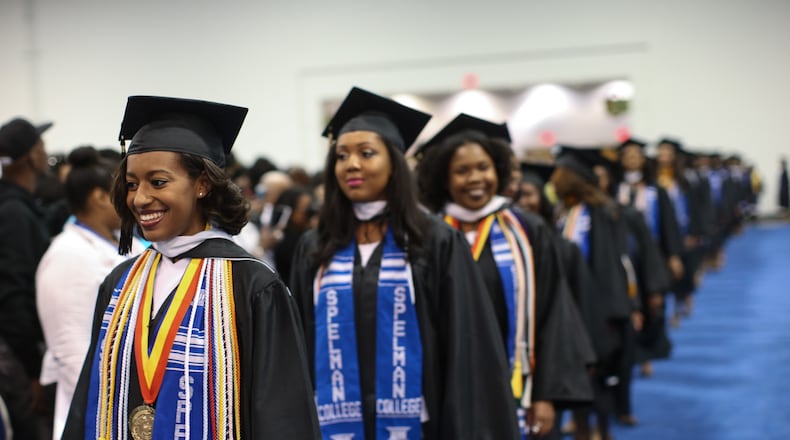Spelman College President Mary Schmidt Campbell shared a response to a recent AJC story on Georgia's Historically Black Colleges and Universities.
In the story, AJC reporter Eric Stirgus noted:
There are few places held in greater esteem among African-Americans than HBCUs. It's where many learn about black historical figures, literature and culture they never learned about in grade and high school. It's where they make lifelong connections through fraternities and sororities. Many graduates followed their parents in attending the same HBCU.
Some HBCUs, with lower tuition and a mission to lift up less academically accomplished students, are often a ladder to better lives for poorer families. There are about 20,000 students in Georgia's 10 HBCUs, both private and state colleges. The Atlanta region's businesses, governments and culture are populated with graduates, from Atlanta Mayor Kasim Reed to Tony-winning director Kenny Leon.
Endowments — money from friends and graduates — to pay for scholarships, professorships and new buildings is smaller on average at HBCUs than most other colleges. The endowment gap between them and other colleges is greater than 100 to 1, according to some accounts.
WIth that background, here is Spelman President Mary Schmidt Campbell's response:
Take, for example, Spelman College, one of the four colleges that, along with Morehouse College, Clark Atlanta University and Morehouse School of Medicine, is part of the Atlanta University Center.
Spelman produces more black women who complete Ph.D.s in STEM fields than any other U.S. institution. We are one of the top 30 colleges in the nation with the highest number of students to study abroad. More than 10 percent of our 2016 graduates were accepted into medical school or health professional programs and over 20 percent of our graduates received nationally and internationally competitive awards. For decades, we have enjoyed clean audits, superior financial ratings, a healthy, growing endowment and balanced budgets.
Spelman's historically high number of admission applications grew by more than 60 percent in the last year alone, and our graduation rate (77 percent) is in the top five of colleges in Georgia and more than 30 percentage points higher than the national completion rate for African-American students in private institutions. A recent poll published in the New York Times demonstrated that students who attended Spelman experienced robust social mobility.
Strong governance by a dedicated and diverse board drives our success as a center for learning and pedagogy as evidenced by our students publishing research with faculty; our faculty attracting multi-millions of dollars in federal funding for innovative research; and our fostering the enduring bonds of sisterhood.
Spelman's success is not unique. Research demonstrates that an education secured on an HBCU campus has a lasting impact on the lives of graduates. A recent Wall Street Journal article cited a Gallup poll that queried almost 60,000 graduates from a range of colleges -- majority serving as well as minority-serving institutions -- and determined that graduates of HBCUs experienced far more lifelong social and emotional well-being and career success than their peers.
What we might ask is how an HBCU education generates this life-long success and durable sense of well-being? What we might ask is how do we expand, nurture and amplify those benefits?
About the Author
Keep Reading
The Latest
Featured



